- Home
- Kevin Ashman
Medieval III - Sword of Liberty Page 5
Medieval III - Sword of Liberty Read online
Page 5
‘And who is this man?’
‘I will unveil his name in due course but suffice to say, he is instrumental in getting the Barons to combine behind our cause. Even before I unveiled your heritage to you, he was dining at the tables of nobles across Wales, sounding out their allegiance and preparing the way for a cause such as this. He carries the flame of freedom in his heart like no other man, an intense furnace of patriotism that will never die and if we are victorious in this campaign, it will be mainly due to years of hidden work by his hand.’
‘He sounds intriguing,’ said Madog,’ and I would indeed like to meet him face to face. Send word and invite him to my Manor.’
‘There is no need, Sire, he is already here and awaits your summons.’
Madog’s eyes widened in surprise.
‘Here? Then by all means, bring him in.’
Geraint left the tent but within minutes returned with his friend.
‘Sire,’ he said, ‘may I introduce Rhodri Ap Gruffydd, also known as Tarian, shield of the poor.’
Madog stood to meet the white haired Knight but before he could say anything, Tarian dropped to one knee.
‘My Lord,’ said Tarian, ‘it is my great honour to meet you at last.’
Madog glanced at Geraint, unsure how to react. Geraint gave him a nod of encouragement and Madog cleared his throat before speaking.
‘Sir Rhodri, please regain your feet, I am no King yet.’
The man stood and gazed into the boy’s eyes.
‘Sire, I once travelled halfway across the world seeking the right person to bear the title Prince of Wales and when I first saw you as a young boy, I knew then what the world did not, that you was indeed of royal blood.’
‘So you are the man who shared the voyage that Geraint has oft retold?
‘I am that man, Sire.’
‘Then the honour is all mine and to be paid homage by a man as great as you is humbling.’
‘Then I am doubly proud to have been the first, Sire and proclaim now before you and my God that I will forthwith serve you loyally even unto death.’
‘Then I am honoured to accept your pledge, Sir Knight and if even half the tales that Geraint has shared prove to be true, then I am also honoured to know one of the bravest men of our time. Please, be seated.’
‘Before I do, Sire, there is one boon I humbly request, after which, no favour will ever be asked of you again in my name.’
‘And what boon is this?’
‘That henceforth, you and all your subordinates, whether Knight or Knave address me by the name by which I have become accustomed, Tarian.’
‘Shield of the poor?’
‘In my day, yes but Tarian will suffice.’
‘Then your boon is granted of course,’ said Madog. ‘Tarian, please be seated. Henceforth my houses are your houses and will offer shelter or support whenever requested in your name.’
‘Thank you, Sire.’
Madog turned to the servant and requested ale be brought as well as food.
‘So, Tarian,’ said Madog, ‘Geraint has regaled me with tales of savages and sea voyages in lands afar. Tell me, is there any reality in these stories or has he embroidered the truth better than a lady of the court does a doublet?’
‘I have no doubt Geraint speaks truly, Sire for I have found him an honest man without equal and there is nothing to be gained in embroidered words. Our journey was indeed a crusade of epic proportions and though it has been many years coming, it may well finally meet fulfilment in the coming months.’
‘I take it you speak of the liberation of Wales?’
‘Indeed I do and it has taken half of my life to see this day. I see before me the one man capable of unifying my country against the invader and knowing that you have accepted the call to arms should see me a happy man.’
‘Should?’
‘Sire, I understand Geraint has explained the stance of Cynan in the south.’
‘He has but surely this is a simple case of diplomacy?’
‘Ordinarily yes but Cynan is a stubborn man. He is also a great leader and a valuable ally but he has seen too many false dawns to commit without being certain of success.’
‘Nothing can offer such certainty.’
‘Perhaps not but he has requested a gesture to prove your claim. A holy task in god’s name.’
‘And what is this task?’
‘He wants you to locate the sword of Macsen.’
Madog looked across at Geraint before returning his gaze to Tarian.
‘The sword of Macsen?’
‘Yes my Lord, are you familiar with the dream of Macsen Wledig?’
‘I am not.’
‘Then to understand the importance of the sword you must first hear his story.’
----
Chapter Five
The Eastern Border of Wales
Nicholas Fermbaud sat astride his horse at the head of the column. Behind him, fifty lancers and two hundred foot soldiers followed the well-trodden road to Monmouth, a necessary re-supplying point in their journey into Wales. Ahead of him, the twelve scouts supplied by Edward ensured they didn’t walk blindly into any traps laid by the Welsh brigands known to infest the area. Fermbaud had been reluctant to take the scouts on the campaign but Edward had insisted and Fermbaud guessed correctly that part of their role was to report back on the aptitude of the untried Knight. As they rode beneath the broad leaved trees of the forest, he saw the leader of the scouts riding back toward him, a dislikeable foreigner of dubious heritage and even worse manners. Fermbaud held up his hand to halt the column and waited for the Dane to approach.
‘Lord Fermbaud,’ said Orland, reining in his horse.
‘Orland,’ greeted the Knight, ‘how lays the path?’
‘The road is clear, but divides in two not ten leagues hence.’
‘The maps are clear,’ said Fermbaud, ‘the right fork leads to Monmouth while the left takes us into Welsh territory. Our men need supplies so our route lies with the former.’
‘Sire, ordinarily I would agree but there is another option for consideration.’
‘Explain?’
‘Sire, there is a village half a day’s ride westward with farmed livestock and well planted fields. I suggest we take a detour and replenish the wagons from this village.’
‘We do not have the coin for such a trade,’ said Fermbaud.
‘I do not suggest we pay,’ said Orland, ‘we will just take what we need in the name of the King.’
‘I don’t think that would go down well with the locals.’
‘Why not? Either they are loyal to the King, in which case they should gladly meet our needs or they are hostile, in which case we are entitled by force of arms to take what we require.’
‘Surely if the latter was the case they would offer resistance?’
‘Perhaps so but isn’t that scenario exactly why we have been despatched on this campaign? To put down such dissent and send a message to the conspirators against the crown?’
‘I’m not sure,’ stuttered Fermbaud.
‘Sire, the choice is of course yours but this is an opportunity to send an early message to the enemy and will also take several days off our journey. On top of this, the men will have an early taste of success and Edward receives word of a successful start to your campaign. Of course, this is my opinion only and I will leave the decision to you.’ He turned to ride away but was called back by Fermbaud.
‘Wait, what arrangements need to be made?’
‘Sire I would not deem to take the place of your sergeants but if it was me I would make all haste while daylight remains and make camp as close as we can without risk of discovery. Then, at first light surround the village with my men at arms so nobody can send for help. When we are ready, send in an emissary with a protective guard to issue our demands but be wary of treachery, these villages are often nests of brigands and you can wager many men already plot against Edward.’
‘And my Lancers?’
‘Make them ready to ride into the village at any sign of dissent. Tell them that if their services are required they are to not hold back and strike with the full force of their weaponry. If there is conflict, we have to take down as many as possible. Hopefully it won’t come to that but we have to prepare.’
‘So be it,’ said Fermbaud. ‘I will ready the column, you find a place to lie low for tonight.’
‘It is already done,’ said Orland, ‘a dense forest less than a mile away from the village yet connected to the same by no path. We will be unobserved there.’
‘You deemed to second guess my decision?’
‘It is always prudent to prepare for all eventualities, Sire,’ said Orland and turned to ride the way he had come. This time there was no call to return.
----
The following morning, a delegation of tradesmen stood across the entrance to Elm’s wood, a small village just inside the border between Wales and England. A hunter, up before the dawn to check his snares, had raised his concern that a column of armed men were making their way to the village and a group of respected inhabitants had quickly gathered to meet the unexpected visitors.
‘Who do you think they are?’ asked Robert, the village blacksmith.
‘I don’t recognise the coat of arms,’ said the hunter, ‘but they are dressed for trouble.’
‘In what way?’
‘They wear their helms and chain mail. Why would they do such a thing unless they expected trouble?’
‘Who knows?’ answered Robert, ‘but they will get no trouble here. We will see what they want, offer refreshment and see them peacefully on their way.’
‘Should we inform Lord Gwion?’
‘I have already sent message. Hopefully he will be here soon.’
The group fell quiet and waited as the early morning mist faded away in the warmth of the sun. Finally the sound of hooves on the small wooden bridge crossing the stream alerted them to the nearness of the horsemen.
‘Remember,’ said Robert, ‘stay calm. As far as we know they are friendly and until proven otherwise, they deserve a warm welcome.’
Within moments, ten lancers rode into the village, closely followed by twenty infantry, men at arms carrying pikes. They stopped before the welcoming party and the lead rider raised his visor to look down at Robert.
‘Welcome, my Lord,’ said the blacksmith with a nod of the head, ‘and a warm welcome to our village.’
‘What place is this?’ asked the rider ‘and whom do I address?’
‘This is the village of Elm’s Wood and I am Robert Ap Evan, village blacksmith.’
‘Do you speak for this village?’
‘Only in the absence of our Lord, Sir Gwion of Montgomery.’
‘I do not know this Knight,’ said the rider.
‘He is a Welsh Lord, knighted by Llewellyn himself.’
The rider sneered.
‘A title not recognised by me,’ he said,’ but nevertheless, I will speak to him. Send word that Godfrey of Bath, second in command to Sir Nicholas Fermbaud, Castellan of Bristol Castle seeks audience with immediate effect.’
‘May I ask to what end, Sire?’
‘No you may not for such matters are between men of nobility, not men of labour.’
‘Of course, Sire, my apologies. Sir Gwion has been sent for but in the meantime, perhaps we could make you comfortable?’
‘You may bring water for the mounts and ale for my men. Is there any bread?’
‘The village oven has been fired but alas it will be a while yet before the first loaves come forth. As soon it is ready we will distribute it amongst your men. We also have some cold pork if that would be acceptable.’
‘It will,’ said Sir Godfrey, dismounting from his horse. ‘While we wait for your master, show me around this village and in particular your cold stores.’
Robert’s eyes narrowed slightly but he nodded slowly in agreement. Godfrey turned to address the guard.
‘Dismount but stay alert. Sergeant Bister, place these people under close guard until I return.’
‘Is that really necessary, Sire?’ asked the blacksmith, ‘I can assure you we offer only peace and friendship.’
‘Friendly words but we know you not and your true intentions may be shielded from us. It is purely a precaution.’
‘Of course, Sire,’ said Robert, ‘please follow me.’
Godfrey turned again to his men and beckoned the two Lancers at the front. ‘You two, come with me. Sergeant, if any harm befalls us, you know what to do.’
‘Yes Sire,’ said Bister.
Robert led the Knight through the small village and headed to a barn. Inside they saw one wall piled high with hay. Against another, two dozen barrels stood side by side while a wooden platform was filled with hessian sacks.
‘What’s in these?’ asked Godfrey.
‘The barrels contain dried fruit while the sacks are our seed stock for the spring.’
‘Is there any grain?’
‘We have a granary half full,’ said Robert, ‘a small amount but with care it will see us through the winter.’
‘What about salted meat?’
‘Seven hams and three sides of beef.’
‘Who owns these?’
‘They are to be sold on behalf of farmers in the outlying fields. There is a market tomorrow.’
‘Geese?’
‘A few dozen around the village but there is a large flock under the control of the egg man.’
‘The egg man?’
‘Sorry, my Lord, a term we use for Tom Davies. His family earns their living tending flocks and he has become known as such.’
Godfrey nodded.
‘And what about livestock?’
‘There are only milk cows in the village. Beef is reared on the hills along with sheep.’
‘Ale?’
‘You will have to speak to Sir Gwion, Sire. He controls the ale for the taverns. We have no wine.’
‘Where are your cold stores?’
‘At the rear of the barn.’
‘Show me.’
They walked outside and down a slope at the rear. A doorway had been cut into the hill and inside, the walls had been lined with stone. A steady trickle of water ran down the rear wall and along a channel in the floor before flowing out of the room and joining a nearby stream.
‘The running water keeps the temperature cool,’ said Robert, ‘and in the winter, we place ice from the streams along the walls. It lasts deep into summer.’
‘A clever arrangement,’ said Godfrey and looked at the meat hanging from the rafters.
‘Whose are these?’
‘They belong to many people, Sire. Oft, the families gather their coins to buy a side between them. It is the only way many can afford meat.’
‘Anything else of value?’ asked Godfrey.
‘Only our chattels.’
‘Nevertheless, you seem well stocked for such a small village.’
‘All taxes are paid to Gwion, Sire I can assure you that. We are a humble population who work hard and share the bounty. We have known hunger and look out for each other but we are also prudent in times of plenty and take measures to ensure the winter is as comfortable as we can make it. The harvest you have seen today is evidence of such prudence.’
‘Are all villages in Wales as blessed?’
‘I cannot answer for them, Sire.’
‘Robert,’ came a cry, ‘our Lord Gwion approaches.’
The blacksmith and the Knight ducked out of the cold room to watch a group of riders approach across the fields below.
‘Is that your master?’
‘It is he.’
‘Then come, we will return to my men.’
----
Ten minutes later, four men rode their horses into the village and pulled up before Godfrey.
‘Sir Gwion,’ said Godfrey, ‘I understand you are the Lord of these parts.’
‘I am, and whom do I have the honour
of addressing?’
‘I am Godfrey of Bath, riding under the command of Sir Nicholas Fermbaud. We are carrying out a task on behalf of the King himself.’
‘Longshanks?’
‘Do you pay homage to any other?’
‘Of course not. I am just surprised to see his emissaries in these parts. He usually leaves us well alone.’
‘He may well have done but we now seek your support in his name.’
‘In what way?’
‘We need supplies enough for five days riding. I have examined this village and there is ample here. I suggest you are well placed to meet the needs of the King’s men.’
Gwion looked around and counted Godfrey’s men.
‘I think this is acceptable,’ he said, ‘I will arrange a pack horse immediately.’
‘A welcome sentiment,’ said Godfrey, ‘but alas a pack horse will be insufficient. Our numbers are ten times this and we will need at least two carts filled with supplies. If you empty the cold stores and include the salted meat it should suffice but in addition you will include twenty loaves and ten barrels of dried fruit. You can keep the grain and the seed for next year’s harvest but we need twenty bales of hay for the horses.’
‘Sire, this will decimate our winter stores,’ said Robert.
Godfrey lashed out with his fist and knocked the Blacksmith to the ground.
‘How dare you interrupt your betters,’ he snarled, ‘now stay quiet or I will have my men give you the beating you deserve.’
‘Good Knight,’ said Gwion, ‘there is no need for such a thing. The man only speaks that which is on all our minds.’
‘Nonsense,’ said Godfrey, ‘you have already said you look after each other in times of need. Show the same mettle and you will no doubt survive. Besides, you seem like a generous soul, I am sure a good master would not see his villagers starve.’
‘Assuming we meet your demands,’ said Gwion, ‘pray tell what payment these people will receive in return.’
‘If you want to pay them, feel free to do so, we will pay nothing as we act in the name of the King.’

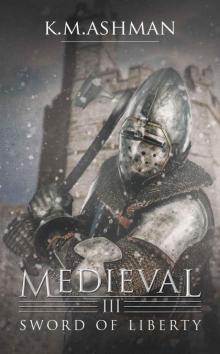 Medieval III - Sword of Liberty
Medieval III - Sword of Liberty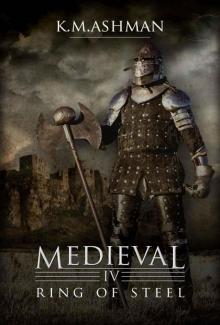 Medieval IV - Ring of Steel
Medieval IV - Ring of Steel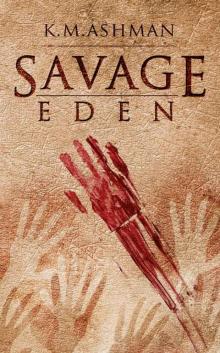 Savage Eden
Savage Eden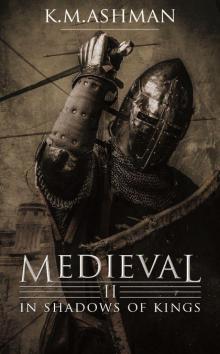 Medieval II - In Shadows of Kings
Medieval II - In Shadows of Kings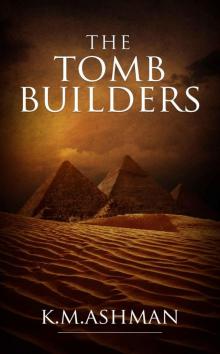 The Tomb Builders
The Tomb Builders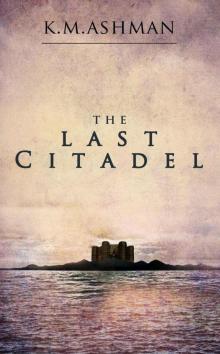 The Last Citadel
The Last Citadel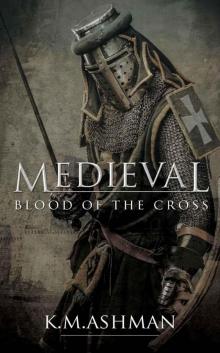 Medieval - Blood of the Cross
Medieval - Blood of the Cross Vampire
Vampire Roman
Roman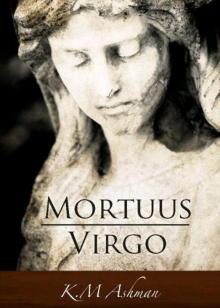 Mortuus Virgo
Mortuus Virgo